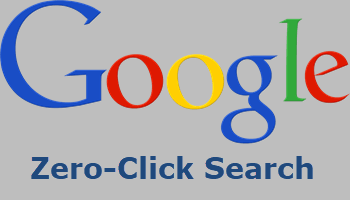The end of websites as we know them?
I came across an interesting article recently wherein the author predicts that search results will no longer include links to websites and the dire consequences of that transformation.
The author believes that with the advent of AI, search engines (and Google in particular) will utilize AI to scrape information from the web and then deliver that information directly on the search results page – no links required.
He further theorizes that this will lead to the virtual elimination of websites and, by extension, associated businesses, such as website hosting services and SEO firms, which will become unnecessary. And all this will come to pass by the end of 2026.
We are already seeing zero-click search results where Google answers simple questions directly on the search results page, but will this expand to the extent that the author predicts?
Will Zero-Click Search Become A Reality?
Firstly, I must correct the author’s terminology who refers to this huge change as a “Zero-Click Internet”. Considering the author’s theories are centered entirely around search results, I believe that the term “Zero-Click Search” is more appropriate.
Now to answer the question; I suspect we will witness this type of transition to a certain degree, but not to anywhere near the extent that the author predicts. Firstly, there are certain websites that by their very nature will always require clicks. For example:
- Online Shopping: while it might still be possible to view and compare prices in a zero-click search environment, it would be impossible to actually purchase anything without visiting the site and going through the purchase process. All of which, of course, requires clicks
- Government/Insurance/Banking and similar essential services will always require clicks, to visit the site and conduct business
I’m sure there would be more examples, and I’m open to suggestions.
Legal Implications
Secondly, in my opinion, the whole idea of AI scraping information from the web and then presenting that information directly on search result pages opens up a can of legal worms. There are so many websites that provide a massive wealth of information – such as IMDb, for example, which provides comprehensive information about every movie and every episode of every TV series ever produced.
I fail to see how that information can be provided directly by Google without some sort of attribution. Sure, Google might agree to pay sites such as IMDb a healthy remuneration for the rights, but even Google couldn’t afford to pay every existing website for the rights to scrape information and then display same without any links or attribution. It simply wouldn’t be viable.
Heck, even DCT, which in reality is a very small fish swimming in a very large ocean, contains masses of information within its archive of almost 7000 articles published over many years.
BOTTOM LINE:
I do concede that the advent of AI is bound to lead to changes, some quite radical, but not to the dire extent that is predicted.
What do you think? Is Zero-Click Search likely to become a reality? Let us know your thoughts via the comments.
—


It’s certainly an interesting idea but I can’t see it working fully the way mentioned either.
I used to run an online radio station for example. We had a built in web player but also opens to listen other ways. Having a page with listen and different buttons worked well and we controlled the design. We had a database with the presenters and their times so it showed the current presenter at the time on the homepage and the current playing song. Someone is still going to need to host all that.
I also think there would be legal issues. Having no sites would mean Google and other search engines would basically be the ones in control of your information to some degree and I think it would lead to anti trust lawsuits